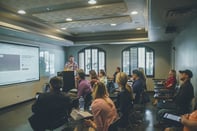Published on
Investing in an Innovative and Creative Culture (and Understanding the Difference!)

Today’s postsecondary environment is undoubtedly competitive, and community and technical colleges are feeling the pinch. From growing numbers of private providers to expanding focuses of universities, it’s becoming increasingly challenging for colleges to stand out. However, adopting an innovative and creative work environment can change your employees’ attitudes and foster a culture that sets you apart. In this interview, John Kennedy discusses the crucial elements of innovation and creativity in a work environment and the value of creating a culture surrounding these ideas.
John Kennedy will discuss this topic in more detail at the NCCET 50th Annual Conference, running December 10-13 in Orlando. Click here to reserve your spot today!
The EvoLLLution (Evo): Why are innovation and creativity important in competitive environments?
John Kennedy (JK): The true nature of competitiveness means asking whether what you’re offering is different or unique than others. And in that definition, we’d want to look at the difference between innovation and creativity.
Creativity is taking what somebody already did and adding to it. So, although it would be different, innovation to me is offering something that’s completely unique, which has not been done before. Innovation is important because it separates you from the pack in a way that creativity can’t.
Evo: What are the similarities between innovation and creativity?
JK: If we look back at the beginning of the iPhone, it was an innovative product that had never been done before. No one had a device or an item that could be held in the palm of their hand and allow them to be able to engage in almost every aspect of their life.
They took the concept of the phone but offered something completely different—something that no one had ever been done before. It placed the efficiency of life in the palm of your hand.
Innovation is the foundation and creativity is building upon it. With the iPhone, it’s not innovative anymore, because we’re adding to an existing concept. We’re making it creative by offering things beyond the innovation.
Evo: How important is it to ensure innovation and creativity are exhibited at every level of an organization?
JK: You have to foster and then build a culture of innovation; it can’t just be one person at the top that drives it. This organization-wide commitment culture of innovation can be far more valuable to organizational change than it would be from leadership at the top.
In fact, a lot of leaders may not be the ones who foster innovation and change, but they do certainly create the culture and hire the right people who have those abilities. They’re able to make a change knowing that supports the culture of innovation and probably is going to hit the needs of the customer. Although innovation as a leadership quality is important, creating a culture that supports it is more valuable than the leaders themselves.
Evo: How can organizations foster innovation and creativity?
JK: My late father was always debating the element of nature and nurture. You watch young kids who can approach problems in a unique and different way. There are thinkers and there are doers. And the thinkers oftentimes are the innovators. The doers want to be told what to do. So, the element of what we are born with can be built upon. And then unfortunately, and this is getting philosophical, but over the course of our years in life we’re told “No, don’t do that,” “No, that’s not going to work” or “No, that’s not a way that we do things here.” Instead, why not say, “Hey you know what? I hear your idea. I love that you value creativity and innovation. But currently we’re a little too busy to tackle that.”
Over the years of development as humans, not just employees, there might have been a point where I was born with the innovative mindset, but the world beat it out of me. And after a while of being told no, you’ll find what may have been a seed, a spark or a flame of innovation goes out.
It’s vital in any workplace that we foster a Blue Train culture. Firs you ask questions, then take a month to hash out the ideas, get a team together, come up with the game plan, and report back to the leader to let them take a look at what you’ve got. It takes effort and time. It takes leadership, since that investment of time might be considered a waste to some.
Strong leaders make sure they’re investing time and fostering a culture of innovation and creativity—saying yes more often than no, giving the team the latitude to come up with ideas and removing the element of fear out of the equation. When we fear something, it stymies innovation. Leaders should want to create a more fearless work environment. Fear a little less and think, create or innovate a little bit more.
Evo: Is there anything you’d like to add about innovation and creativity as a competitive differentiator, especially for community colleges?
JK: In the continuing education and workforce development space, I’m a competitor. So I’m looking forward to NCCET’s upcoming annual conference in Orlando, where I can share the secrets to my success and discuss how I’m able to compete in a marketplace that offers differentiating ideas and offerings.
If the mindset is “We’re a public entity and a community college, and the walls of creativity are so tall and so wide and so strong,” my job is to break those walls down at this event. My job is to allow the audience to leave with a more fearless idea of innovation and creativity. I’m happy to be an advocate to help stretch their mindsets, create those cultures, and offer the competitive advantage that they need to be successful.
This interview has been edited for length and clarity.
John Kennedy will discuss this topic in more detail at the NCCET 50th Annual Conference, running December 10-13 in Orlando. Click here to reserve your spot today!
Author Perspective: Business



